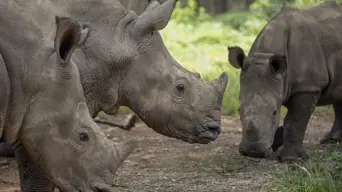Mass dehorning in KZN's Hluhluwe-iMfolozi Park leads to 80% drop in rhino poaching
To date, the operation has protected approximately 120 rhinos and facilitated the rescue of eight orphaned calves, whose mothers were tragically killed.

FILE: Rhino calves are seen at the Rhino Orphanage in an undisclosed location near Mokopane, Limpopo province, on 9 January 2021. Picture: AFP
Mike Wills interviews Jeff Cooke, Manager of WWF South Africa’s Rhino Conservation Programme.
Listen below.
The mass dehorning of rhinos in Hluhluwe-iMfolozi Park (HiP), KwaZulu-Natal, this year has led to an impressive 80% reduction in poaching since the operation began in April.
This ongoing dehorning initiative is a collaborative effort between Ezemvelo KZN Wildlife, the provincial conservation agency, and the World Wide Fund for Nature (WWF), with valuable support from Wildlife ACT, Save the Rhino International and Zululand Wildlife Vets.
RELATED: Wits University finds 'radioactive' way to save rhinos from horn poachers
To date, the operation has protected approximately 120 rhinos and facilitated the rescue of eight orphaned calves, whose mothers were tragically killed.
Cooke emphasises that this intervention is a temporary measure, providing the park with crucial breathing room to develop and implement more sustainable strategies.
He notes that by the end of 2023, the park had lost around 300 rhinos, and without the dehorning operation, projections suggested that number could have surged to nearly 400 by the start of this year.
"The poaching rates have dropped to single digits every month."
- Jeff Cooke, Manager – WWF South Africa’s Rhino Conservation Programme
Scroll up to the audio player to listen to the interview.